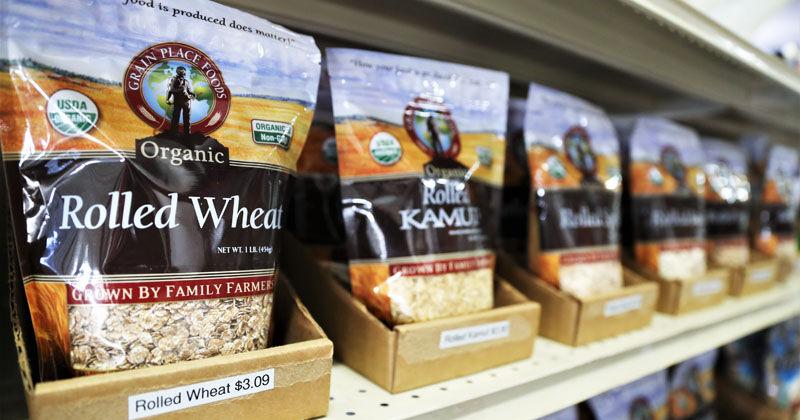Grain Place Foods provides a large variety of organic and non-GMO products such as oats, popcorn, and even honey. The Marquette business has worked to make what seems impossible, possible, including innovating their processing machinery.
MARQUETTE — Time and time again, Grain Place Foods in rural Marquette has heard the phrase, “It can’t be done.”
It’s a phrase tossed at the company by potential clients for years, but Grain Place Foods has taken up the challenge and shown that yes, it can be done.
It began with a farm (that still exists) in 1954, when CEO David Vetter’s father started converting to organic crops. Several years down the road, in the 1960s, Vetter’s father had a recurrence of malaria contracted during World War II. “He spent most of 1960 in the VA hospital, so he had to quit farming. I came back after graduate school and then started farming in 1975. And then we started converting foreign backed organic grain.”
A short time later, Vetter decided there must be a better way than farming a small number of acres (the farm still exists as “The Green Place”). “We weren’t in it very long, realizing that if we were going to make it work on a small farm, less than 280 acres, I think, we were going to have to find a way to add value. So we started putting together a cleaning operation.”
David Vetter, CEO of Grain Place Foods in Marquette, tells the story of his company, which started out as a small-scale organic farm. In the backgroud hangs a map showing the corners of the world where Grain Place Foods products have been distributed.
At that time, there were few options for this that served organic operations, and getting the raw product ready for customers was an endeavor, Vetter said.
“We hauled all around the area driving two hours one way, cleaning truck load, loaded by hand, haul it back, unload it, load the truck back up and do it again the next day to get orders ready for our customers.”
Their first customer was a company that owned a product commonly seen in grocery store refrigerator cases.
“Our first big customer was a little company known as White Wave. You’re probably familiar with them now.”
At that time, White Wave was the original company behind Silk non-dairy milk, like oatmilk and soy milk.
“We were among the first soybean suppliers to White Wave company back in 1977,” Vetter said. “In less than five years, his company’s growth was so great he couldn’t stay in business.”
The White Wave owner sold the company in the late 1990s.
In the mid-1980s, Grain Place Foods took advantage of a trend in food consumption, Vetter said.
“That was at a time when the craze was oats and oat bran. We decided we were going to do organic rolled oats and oat products, so we did oat bran and we did rollouts of a couple of different varieties, and have partnered with another small company up in the Dakotas to do the dehulling and bring them down here for us,” Vetter said. “We use a different process for traditional steam cooking process.”
The processing center for Grain Place Products contains top-of-the-line grain cleaning and storage equipment, such as this machine that is able to separate grains automatically by detecting color variations.
Grain Place Foods consulted with someone in the industry, who said the oats couldn’t be processed that way with Grain Place Foods’ machinery. Again, Vetter and Grain Place Foods proved it could be done.
“Now we’ve been doing that for almost 30 years.”
In the beginning, The Green Place supplied the grains for Grain Place Foods’ production — about 85-90%, Vetter estimated. Now, he said, the farm supplies only about 1% of raw product. Crops handled by Grain Place Foods today include red and white winter wheats, barley, whole grain rice and rolled grains like rolled oats.
“Early on for us our big market was whole soybeans, popcorn and corn and wheat,” Vetter said.
In 1990, the company was approached by Greg Harrison of C.J. Foods about organic bird food, Vetter recalled. “He told me what he wanted to do. He said, everybody else we’ve talked to you says it can’t be done. And then he said, ‘Can you do it?’ Looking at it quite a bit I said, ‘Well, number one, I don’t understand why it can’t be done. But number two, I don’t have a clue how to do it. But if you’re willing to help us figure it out, we’ll try it.’”
It turns out, it could be done.
“We’re making about 2 million pounds a year,” Vetter said.
“Probably now about half of our business is high value, pet foods,” Vetter said. “We make a line of companion bird diets for a company based in Tennessee.”
Grain Place Foods CEO David Vetter’s goal at the company is to provide customers with organic grain products that are grown in an ecologically regenerative manner. He says Grain Place Foods likes to work with businesses with the highest of standards.
That includes bird “cake mix,” Vetter said. “It bakes like a cake. It works great in a cupcake tin or a small loaf tin. It’s really amazing product because that’s the only product that macaws from the wild can eat. When they are put on a good diet they can raise their own young in captivity, but it’s also probably the most expensive on the market.”
Bird food is the predominant product of Grain Place Foods that goes to Japan, though rolled hot breakfast cereals have also proven popular.
Popcorn is another staple put out by Grain Place Foods. Organic microwave popcorn — both white and yellow varieties — are packaged on-site, and a lab dedicated to popcorn testing is filled with measuring and analyzing equipment, a testing popcorn popper and a delicious aroma. Popcorn was one of Grain Place Foods’ first products, when there were multiple small popcorn outfits scattered across Nebraska, Vetter said.
“There were probably 30 little popcorn companies scattered around the state, oftentimes set up in old wooden grain elevators. We worked with a couple of those. They took their portrayed popcorn that didn’t pop well and sold a lot to companies that ended up in cornmeal. We shipped a lot of that into into Lebanon.”
Their Lebanese customers in the 1980s had special packaging requests, however, Vetter said. “The big Middle East warzone was Lebanon. Popcorn was shipped in 50 pounds burlap bags that were lined.” Why? The empty bags were re-purposed into sandbags to help fortify locations in the war-torn nation.
Penny Davis of Grain Place Foods watches over the belt conveyor system used to package bags of microwave organic popcorn.
Grain Place Foods also helped Quinn Snacks get off the ground, Vetter said. “We worked closely with Quinn to help them get started. Kristy Lewis formed that company and she started with an idea while she was pregnant with her first kid. We helped her get started. Great, great, great, great, energetic young woman to work with. She’s pretty amazing.”
Vetter said the outlook for organic grains is full of potential.
“I expect to see growth. We have a shortage right now,” he said, citing the organic soybean market as an example. “There are some big trade disputes going on with the supply of organic soybeans coming out of India, which it looks like have been artificially price supported. They really undercut the market and the price for domestic growers — at one point about 60%, I believe, with the highest number of the soybeans that were used to make organic feed or feed ingredients in processing are imported, because when there wasn’t enough domestic supply when it could have been grown here.”
Vetter also said organic product companies seem to have an especially high standard for what goes into their products.
“We’ve got companies that are committed that we do work with to using high quality ingredients, and they’re willing to pay what it takes to do that. They’re willing to pay a fair price, but their standards are high and they demand a lot. Sometimes they’re frustrating to work with, but that’s the kind of company you want to work for.”
While Grain Place Foods has been an immense success in terms of pounds and production, for Vetter it’s something else he finds most satisfying.
“The most rewarding thing is figuring out how to do stuff people said we couldn’t do. We have a couple of customers right now because everybody else they talked to said it can’t be done, so I kind of like that piece. Right now we’re making it work great.”
jessica.votipka@theindependent.com
Jessica Votipka is the education reporter at the Grand Island Independent. She can be reached at 308-381-5420.
Where to find its products:
Grain Place Foods: 1904 Highway 14 (south and east of Marquette), 8 a.m. to 5 p.m. Monday through Friday; facility tours available; 888-714-7246;
Aurora Mall: 1320 16th St., Aurora
Natural Food Products: 707 W. State St., Grand Island
Online: https://grainplacefoods.com/
Subscribe to our Daily Headlines newsletter.
Reporter
Jessica Votipka is the education reporter at the Grand Island Independent. She can be reached at 308-381-5420
{{description}}
Email notifications are only sent once a day, and only if there are new matching items.
Nathan Detroit’s, owned by Robert Mahood, operated in the current location of Kinkaider Brewing Co. The business opened in 1984.
He was arrested for felony attempted visual depiction of sexually explicit conduct, and a misdemeanor charge involving obscene material.
Gameroom, a buy/sell/trade store, started in 2007, and expanded to Omaha. Plans for an expansion to Grand Island started in 2019.
Three young men left Walmart with a pair of TVs, which they planned to go home and sell immediately on eBay.
The conditional use permit approved by the Grand Island City Council starts in November and expires in April.
Attendees will pray for the U.S. Supreme Court justices as they hear arguments in Dobbs v. Jackson on Wednesday.
There will be 200 combines total, with eight to 10 being transported and worked on per day.
The circumstances related to the fire, the burn victim and any other person remain the focus of the investigation.
With several former students who went into the military the teachers thought it only appropriate to donate to veterans’ projects.
In the weeks leading up to Oct. 15, the apartment in northwest Grand Island was filled with anticipation. Across the country, in homes in Cali…
Grain Place Foods provides a large variety of organic and non-GMO products such as oats, popcorn, and even honey. The Marquette business has worked to make what seems impossible, possible, including innovating their processing machinery.
David Vetter, CEO of Grain Place Foods in Marquette, tells the story of his company, which started out as a small-scale organic farm. In the backgroud hangs a map showing the corners of the world where Grain Place Foods products have been distributed.
The processing center for Grain Place Products contains top-of-the-line grain cleaning and storage equipment, such as this machine that is able to separate grains automatically by detecting color variations.
Grain Place Foods CEO David Vetter’s goal at the company is to provide customers with organic grain products that are grown in an ecologically regenerative manner. He says Grain Place Foods likes to work with businesses with the highest of standards.
Penny Davis of Grain Place Foods watches over the belt conveyor system used to package bags of microwave organic popcorn.
Get up-to-the-minute news sent straight to your device.




